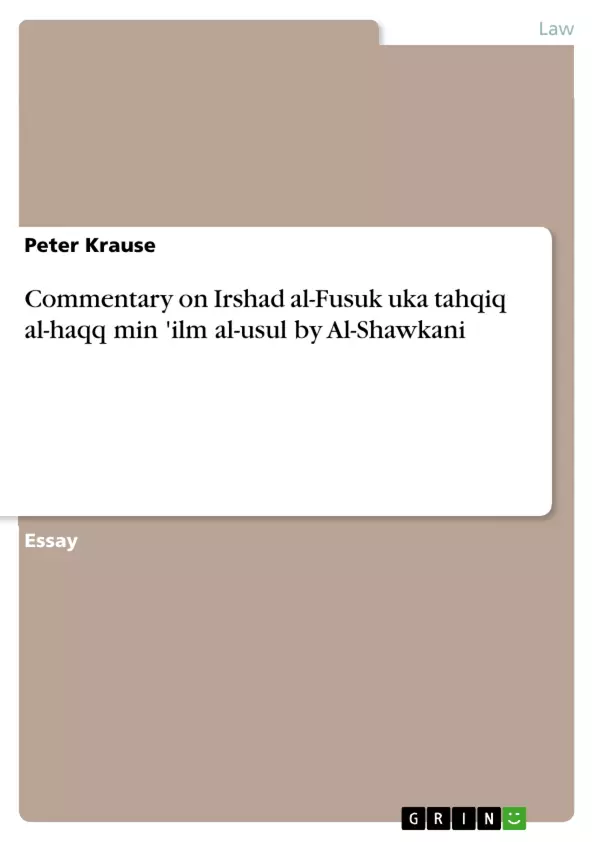The text “Irshᾱd al-Fuhῡl ilᾱ tahqῑq al-haqq min ῾ilm al-uṣῡl” is written by Muhammad ῾Alῑ b. Muhammad Al-Shawkᾱnῑ. He is a Sunnῑ legal scholar, writer and teacher from Yemen, who lived from 1760 until 1849. Al-Shawkᾱnῑ is seen as one of the most influential modern Islamic jurists, which is supported by the qualification of him as 'mudjaddid' or 'regenerator' by Rashīd Ridā. Al-Shawkᾱnῑ achieved a good reputation by working on defining requirements to attain the different status as a jurist. He is described as “an ardent opponent on the restrictions of ijmᾱʿ” and known “for his support for the greater use of the ijtihᾱd”. This text fits in his released literature about the requirements of attaining different levels of legal scholarship. Roughly translated, the title means: “Guideline for the experts to achieve the truth in the science of the principles of the law“. Al-Shawkᾱnῑ gives in his text basic conditions, which are required to be a mujtahid. In my opinion a mujtahid is a Muslim jurist, who has the ability to perform ijtihᾱd. Al-Shawkᾱnῑ specifies what a mujtahid is in paragraph two. In his opinion, a mujtahid must try to acquire an opinion of a legal rule and have the ability to derive legal rules by working with the legal sources. Obligatory for this are adulthood and sanity. After this section, he starts listing the conditions, but obviously, adulthood and sanity are also requirements to be a mujtahid. The difference to the following conditions is, that this inherent quality can not be changed by the prospective mujtahid in contrast to the following acquirable conditions
Inhaltsverzeichnis (Table of Contents)
- Conditions for becoming a Mujtahid
- Knowledge of the primary texts of Islamic Law
- The importance of knowing the Qur'an and Sunnah
- Evaluating knowledge of the Hadith
- Knowledge of questions regarding Ijmā
Zielsetzung und Themenschwerpunkte (Objectives and Key Themes)
This text, "Irshad al-Fuhūl ilā tahqīq al-haqq min ‘ilm al-uṣūl”, written by Muhammad 'Ali b. Muhammad Al-Shawkānī, a prominent Islamic jurist from Yemen, aims to establish the essential conditions required for attaining the status of a mujtahid. Al-Shawkānī examines the qualifications and knowledge necessary for a jurist to engage in independent reasoning and derive legal rulings from Islamic sources. He discusses the crucial role of understanding the primary texts of Islamic Law, the importance of evaluating hadith, and the need for familiarity with the concept of Ijmā' (consensus) in Islamic jurisprudence.
- Defining the Qualifications of a Mujtahid
- The Role of the Qur'an and Sunnah in Islamic Law
- The Significance of Hadith and its Evaluation
- The Concept of Ijmā' (Consensus) in Islamic Jurisprudence
- The Importance of Knowing Juristic Disagreements
Zusammenfassung der Kapitel (Chapter Summaries)
Al-Shawkānī begins by defining a mujtahid as a jurist capable of independent reasoning and deriving legal rulings. He then delves into the primary condition: the knowledge of the primary texts of Islamic Law, specifically the Qur'an and Sunnah. He discusses the importance of understanding the texts and their implications, rejecting the notion that mere memorization of a limited number of verses or hadith suffices. Al-Shawkānī emphasizes the need for in-depth analysis and evaluation of the hadith's trustworthiness and evidence.
Moving on to the second condition, Al-Shawkānī underscores the necessity for a mujtahid to understand questions related to Ijmā', the consensus of Islamic scholars. He argues that this knowledge is crucial to ensure that legal rulings do not contradict the established consensus. Al-Shawkānī suggests that a mujtahid must be aware of the various aspects of Ijmā', including the definition of consensus, the process of achieving it, and the potential for disagreements among scholars.
Schlüsselwörter (Keywords)
The text focuses on the concepts of ijtihād, mujtahid, Qur'an, Sunnah, Hadith, Ijmā', legal scholarship, Islamic jurisprudence, and juristic disagreements.
Frequently Asked Questions
Who was Al-Shawkānī?
Muhammad ‘Alī b. Muhammad Al-Shawkānī (1760–1849) was an influential Sunni legal scholar and teacher from Yemen, often regarded as a 'mudjaddid' or regenerator of Islamic law.
What is a Mujtahid in Islamic jurisprudence?
A Mujtahid is a Muslim jurist who possesses the necessary qualifications and ability to perform ijtihād, which means deriving legal rules through independent reasoning from primary sources.
What are the primary conditions for becoming a Mujtahid according to Al-Shawkānī?
Essential conditions include adulthood, sanity, profound knowledge of the Qur'an and Sunnah (Hadith), and familiarity with the consensus (Ijmā') and juristic disagreements.
Why is the evaluation of Hadith critical for a Mujtahid?
A Mujtahid must be able to analyze the trustworthiness and evidence of Hadith to ensure that legal rulings are based on authentic and reliable prophetic traditions.
What role does Ijmā' (consensus) play in Al-Shawkānī's work?
Al-Shawkānī emphasizes that a Mujtahid must understand Ijmā' to ensure that new legal rulings do not contradict established scholarship and to understand where disagreements among scholars exist.
- Arbeit zitieren
- Peter Krause (Autor:in), 2014, Commentary on Irshad al-Fusuk uka tahqiq al-haqq min 'ilm al-usul by Al-Shawkani, München, GRIN Verlag, https://www.hausarbeiten.de/document/416097


